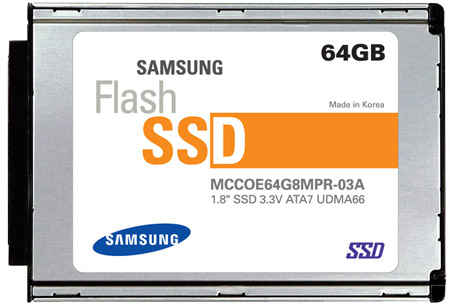MacBook Air Diary-Day 9: Is the SSD overhyped?


The MBA hard drive has its share of problems: it's small, slow, PATA, etc. (but that's a topic for another blog post.) According to benchmarks posted by ArsTechnica the flash/SSD option in the MacBook Air may not be all that it's cracked up to be.
In their tests they pitted the MacBook Air HDD against the pricey SSD model and the results are surprising. The MBA SSD took 28.5 seconds to boot, 12 seconds faster than the HDD model and 11.5 seconds faster than the Santa Rosa MacBook but 2.5 seconds slower than the Santa Rosa MacBook Pro. Eeek!
In sequential read and write tests the HDD model outperformed the SSD model:
The overall disk test scores aren't much different—29.37 on the HDD and 34.30 on the Air. But the SSD performs a fair amount worse than the HDD model when it comes to sequential read and write tests. The SSD was able to write sequentially between 14.67 and 13.86MB/sec, and sequentially read between 7.29 and 49.59MB/sec (the first and second numbers are differentiated by the size of the blocks being written). Comparatively, the HDD model sequentially writes between 31.35 and 33.33MB/sec, and reads between 6.32 and 32.74MB/sec for the same-sized blocks.
(emphasis mine)
But these results aren't totally surprising...
A spinning HDD platter will perform well in sequential read and write tests because it benefits from the rotational speed of the mechanism. The problem is that after the first few days of using a new/reformatted HDD it becomes fragmented and most disk access thereafter is random.
Random disk access is where SSDs have a distinct advantage. While a mechanical hard drive takes time to move its arm and head to random locations on the platter, the SSD can (almost) instantly jump between random locations. It's like comparing fast forwarding a VHS tape (HDD) to skipping to the next chapter of a DVD (SSD).
In the Ars benchmarks the SSD MacBook Air's overall random read/write score was more than 40 percent higher than the HDD model.
While the HDD model was writing 256k blocks at 22.95MB/sec, the SSD Air was writing at 19.04MB/sec. But read speeds are significantly faster, and the HDD model read the 256k blocks at 14.37MB/sec while the SSD read at 47.61MB/sec.
While boot times and sequential disk access are nothing special in the SSD model, random disk access may make up for these deficiencies. For me, the SSD just isn't worth the large cash outlay. This time next year the MBA will have a 128GB SSD for around US$500, at which point I'll jump on the bandwagon.
The real question is what the SSDs impact will be on battery life–a potentially huge issue because of the MBA non-removable battery.
[poll id=95]
[poll id=96]